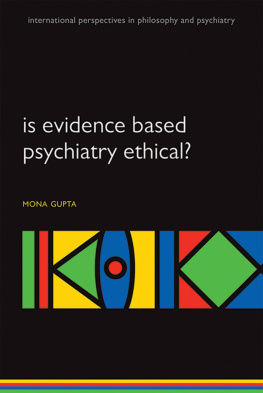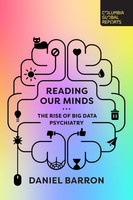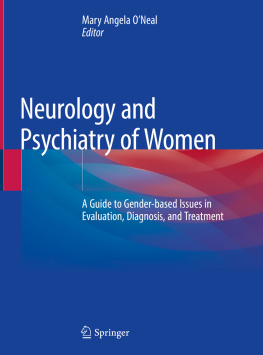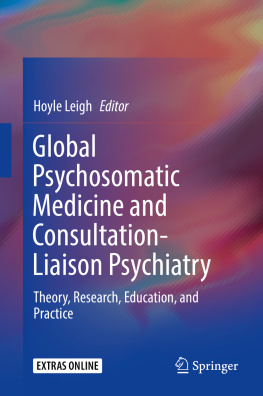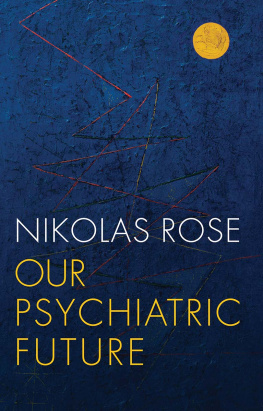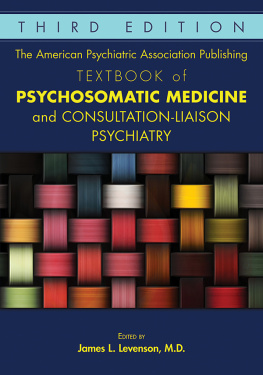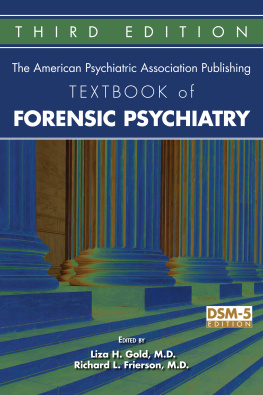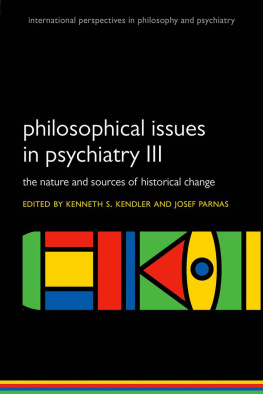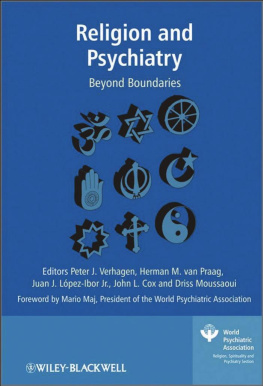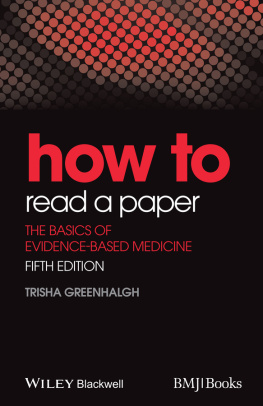Is Evidence-based Psychiatry Ethical?
International Perspectives in Philosophy and Psychiatry
Series editors: Bill (K.W.M.) Fulford, Lisa Bortolotti, Matthew Broome, Katherine Morris, John Z. Sadler, and Giovanni Stanghellini
Volumes in the series:
Portrait of the Psychiatrist as a Young Man: The Early Writing and Work of R.D. Laing, 19271960
Beveridge
Mind, Meaning, and Mental Disorder 2e
Bolton and Hill
What is Mental Disorder?
Bolton
Delusions and Other Irrational Beliefs
Bortolotti
Postpsychiatry
Bracken and Thomas
Philosophy, Psychoanalysis, and the A-Rational Mind
Brakel
Unconscious Knowing and Other Essays in Psycho-Philosophical Analysis
Brakel
Psychiatry as Cognitive Neuroscience
Broome and Bortolotti (eds.)
Free Will and Responsibility: A Guide for Practitioners
Callender
Reconceiving Schizophrenia
Chung, Fulford, and Graham (eds.)
Darwin and Psychiatry
De Block and Adriaens (eds.)
Oxford Handbook of Philosophy and Psychiatry
Fulford, Davies, Gipps, Graham, Sadler, Stanghellini, and Thornton
Nature and Narrative: An Introduction to the New Philosophy of Psychiatry
Fulford, Morris, Sadler, and Stanghellini (eds.)
Oxford Textbook of Philosophy and Psychiatry
Fulford, Thornton, and Graham
The Mind and its Discontents
Gillett
Thinking Through Dementia
Hughes
Dementia: Mind, Meaning, and the Person
Hughes, Louw, and Sabat (eds.)
Talking Cures and Placebo Effects
Jopling
Philosophical Issues in Psychiatry II: Nosology
Kendler and Parnas (eds.)
Discursive Perspectives in Therapeutic Practice
Lock and Strong (eds.)
Schizophrenia and the Fate of the Self
Lysaker and Lysaker
Responsibility and Psychopathy
Malatesti and McMillan
Body-Subjects and Disordered Minds
Matthews
Rationality and Compulsion: Applying Action Theory to Psychiatry
Nordenfelt
Philosophical Perspectives on Technology and Psychiatry
Phillips (ed.)
The Metaphor of Mental Illness
Pickering
Mapping the Edges and the In-between
Potter
Trauma, Truth, and Reconciliation: Healing Damaged Relationships
Potter (ed.)
The Philosophy of Psychiatry: A Companion
Radden
The Virtuous Psychiatrist
Radden and Sadler
Addiction and Weakness of Will
Radoilska
Autonomy and Mental Disorder
Radoilska (ed.)
Feelings of Being
Ratcliffe
Recovery of People with Mental Illness: Philosophical and Related Perspectives
Rudnick (ed.)
Values and Psychiatric Diagnosis
Sadler
Disembodied Spirits and Deanimated Bodies: The Psychopathology of Common Sense
Stanghellini
One Century of Karl Jaspers Psychopathology
Stanghellini and Fuchs (eds.)
Emotions and Personhood
Stanghellini and Rosfort
Essential Philosophy of Psychiatry
Thornton
Empirical Ethics in Psychiatry
Widdershoven, McMillan, Hope, and Van der Scheer (eds.)
The Sublime Object of Psychiatry: Schizophrenia in Clinical and Cultural Theory
Woods

Great Clarendon Street, Oxford, OX2 6DP, United Kingdom
Oxford University Press is a department of the University of Oxford. It furthers the Universitys objective of excellence in research, scholarship, and education by publishing worldwide. Oxford is a registered trade mark of Oxford University Press in the UK and in certain other countries
Oxford University Press 2014
The moral rights of the author have been asserted
First Edition published in 2014
Impression: 1
All rights reserved. No part of this publication may be reproduced, stored in a retrieval system, or transmitted, in any form or by any means, without the prior permission in writing of Oxford University Press, or as expressly permitted by law, by licence or under terms agreed with the appropriate reprographics rights organization. Enquiries concerning reproduction outside the scope of the above should be sent to the Rights Department, Oxford University Press, at the address above
You must not circulate this work in any other form and you must impose this same condition on any acquirer
Published in the United States of America by Oxford University Press
198 Madison Avenue, New York, NY 10016, United States of America
British Library Cataloguing in Publication Data
Data available
Library of Congress Control Number: 2014933290
ISBN 9780199641116
eISBN 9780191028311
Oxford University Press makes no representation, express or implied, that the drug dosages in this book are correct. Readers must therefore always check the product information and clinical procedures with the most up-to-date published product information and data sheets provided by the manufacturers and the most recent codes of conduct and safety regulations. The authors and the publishers do not accept responsibility or legal liability for any errors in the text or for the misuse or misapplication of material in this work. Except where otherwise stated, drug dosages and recommendations are for the non-pregnant adult who is not breast-feeding
Links to third party websites are provided by Oxford in good faith and for information only. Oxford disclaims any responsibility for the materials contained in any third party website referenced in this work.
To my patients
Acknowledgements
Writing this book was both an engaging and a demanding experience, in all of the ways that make academic life rich and rewarding. It was, admittedly, less glamorous than I had imagined, with long hours spent in my windowless basement, dressed in track pants, and surrounded by unpacked boxes from a house move that had occurred two years previously. But these temporary inconveniences were minor compared to the contributions of so many people who have helped me along the way.
The book began its life as my doctoral dissertation, completed at the University of Toronto. I owe a debt of gratitude to my thesis committee for their unfailing support and guidance: Ross Upshur (my supervisor), Bill Harvey, Lynne Lohfeld, and Lawrie Reznek. Anthony Levitt was my department chief during these years. He believed in me and his support enabled me to fulfil my dream of having a career in academic medicine.
The research that formed the basis of this book could not have been completed without the research participants, who gave their time generously and trusted me with their insights. The Canadian Institutes of Health Research provided invaluable financial support. Bill Fulford, editor of the IPPP series, has been a mentor from the start. Martin Baum and Charlotte Green at Oxford University Press (UK) offered the correct proportions of persistence and patience. Robyn Bluhm, Suzanne Leclair, Nancy Potter, John Sadler, and Peter Zachar unhesitatingly reviewed various chapters and provided detailed and constructive feedback.
I am very grateful for the extensive moral and material support I have received during my career. I had just started writing the book when I moved from Toronto to Montral to the Centre Hospitalier de lUniversit de Montral (CHUM). My colleagues there welcomed me warmly and maintained a regular supply of optimism and chocolate, encouraging me at every turn. The CHUMs Department of Psychiatry and Centre de Recherche, as well as the Department of Psychiatry of the University of Montral, have supported me as a clinician-investigator, both valuing and promoting the humanities in psychiatry.

